Dark, moist and ‘bunk beds’; these are the characteristics of an average mushroom nursery. Belgian company Districhamp is doing things completely differently. The nurseries are bathed in light, the air isn’t too moist and bunk beds are nowhere to be found. The Delbeke brothers have their own vision for the mushroom production, in which automation should play a large part.
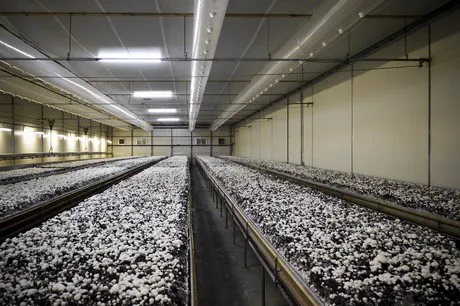
Perhaps the brothers, who run the company together, are a bit self-willed. The nursery in Pittem, Belgium, does practically everything slightly differently than a lot of other production companies. They’re hardly young anymore, they’re seasoned mushroom growers. The three brothers started in the mushroom production in the late 1970s, each with their own production company. “In the 1990s, the sectors came under a lot of pressure, that’s why we decided to bundle our sales, and enter the market directly,” says Paul Delbeke. Because of that, the brothers had a larger volume and a wider range of packaging at their disposal. At first, only the sales were bundled. Since 2004, the production has also been completely housed in Pittem in West-Flanders. Around 100 tonnes of white mushrooms are currently grown per week, partly for industry and partly for the fresh market.
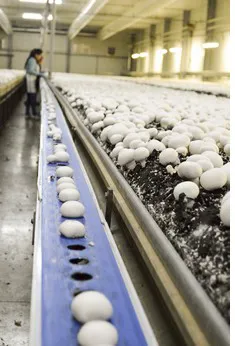 Dutch pressure on prices across the border
Dutch pressure on prices across the border
Recently, a lot could be read in Dutch media in particular about the difficult position of mushroom growers. “I think pressure is even higher in the Netherlands than it is here,” Paul says. “But that report wasn’t framed properly. It could be that a supermarket promotes mushrooms below cost price, but in the end, it’s the average price of an entire year that matters.” The effects on the Dutch market can be felt by the neighbours to the south. Dutch growers are looking for sales options in Belgium. “Most of the Belgian supermarkets are sticking with Belgian origins,” he continues. Because of that, domestic mushrooms are still one step ahead of import.
Eastern European competition is also felt in the Belgian sector. Yet Paul sees opportunities for the Western European production. “Cost prices are lower in Eastern Europe, due to lower wages in particular, but we can be distinctive with a fresh product of great quality. In Eastern Europe, they’re having problems because of longer transportation times. They don’t have quick delivery times, nor last minute orders like we have.” Within some hours after the harvest, Districhamp’s mushrooms can be put on transport. White mushrooms for a customer in Southern France, for example, is placed on transport the same day as it’s picked. For customers closer to home, the lorries also depart before the end of the day. “Everything has to be done quicker than in the past. Product was brought to the auction in the evening back then, and it would be auctioned of the next morning. Things can’t be done quick enough nowadays. A good dialogue with the buyers is very important to guide sales. This is to the advantage of the customer, but it’s even more in the interest of quality. Good quality sells itself.”
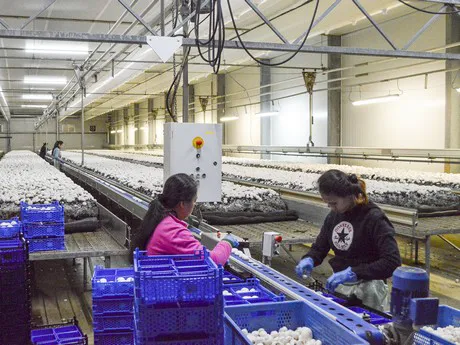
One-layered beds: picking more pleasantly
Besides white mushrooms from their own production, Districhamp also supplies oyster mushrooms, shiitake and chestnut mushrooms that are bought from other growers. Other varieties can be supplied on demand to customers spread across Belgium, France, the UK, Germany and the Netherlands. The company is specialised in growing larger sizes. According to Paul, products like the miniature mushroom don’t have much of a future in Western Europe, because the production isn’t profitable (too few kilos per square metre and picking costs are far too high).
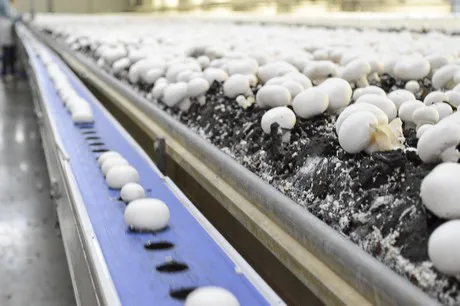
“Our goal is once again levelling out the competitive position of Belgian growers by making focused investments, which decrease the difference in cost price with Eastern European growers.” When Paul opens the door of one nursery chamber, it’s immediately noticeable that the room isn’t filled with racks. Six beds, each with one layer of white mushrooms, fill the room. “We grow exclusively on one-layered beds,” Paul explains. “It’s much calmer and more pleasant for the pickers. There are no shadows, and at the same time, it’s more ergonomic. As soon as you enter the chamber, you get a good view of everything in the room at once.”
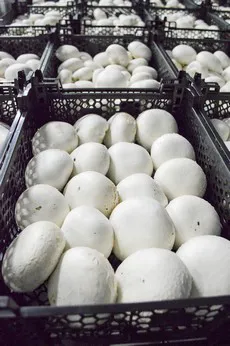 Low disease pressure and automation
Low disease pressure and automation
Growing on one-layered beds has more advantages. Firstly, the pressure of diseases is lower. “Pesticides aren’t often used in the production of mushrooms, but we use none at all,” Paul continues. “That’s our trump card.” According to Paul, the nurseries are more sterile than with multiple-layered production, because the production takes place in two different rooms. “We don’t have to disinfect the rooms or steam them to death after the production.” This results in a lower energy bill, which had already been reduced due to the solar panels on the roof. Besides, the heat of the cooling compressors is used to heat the nurseries, resulting in an additional reduction of costs.
However, the low disease pressure is also a result of the production. “We grow according to a short schedule of two spans,” he explains. The mushrooms are harvested semi-automatically. Four people are enough to harvest one bed. A narrow conveyor belt is placed alongside the bed that’s being harvested. Two pickers start on one side of the bed each, and they work towards each other. The large mushrooms are picked and placed on the conveyor. At the end of the belt, the stems are automatically removed, after which two workers place the mushrooms in punnets.
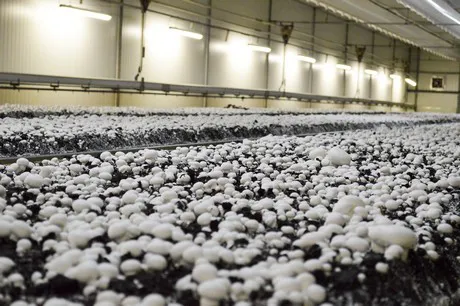
Automation will become more and more important in the next few years. “If you don’t invest in automation, you’ll only be in more trouble in the coming years,” Paul expects. “Automation will also become necessary for multiple-layered production.” The picking costs are about 40 per cent of total costs. “If we can cut this in half, the difference with Eastern European competition will disappear, and we’d have an advantage. That’s our challenge for the next few years.” The three brothers won’t be standing still, they’re looking for ways to automate and optimise the harvest even more. The next step is a new machine that allows the knives cutting off the stems to be adjusted in height, resulting in less waste. But the brothers are also looking into the options of using robots. For now, the return and the final product of the harvesting robots is still insufficient for the fresh market, but Paul says they’re working on an alternative with “promising” results. “This conversation is definitely to be continued!”
More information:
Districhamp
Paul Delbeke
www.voc-districhamp.be
